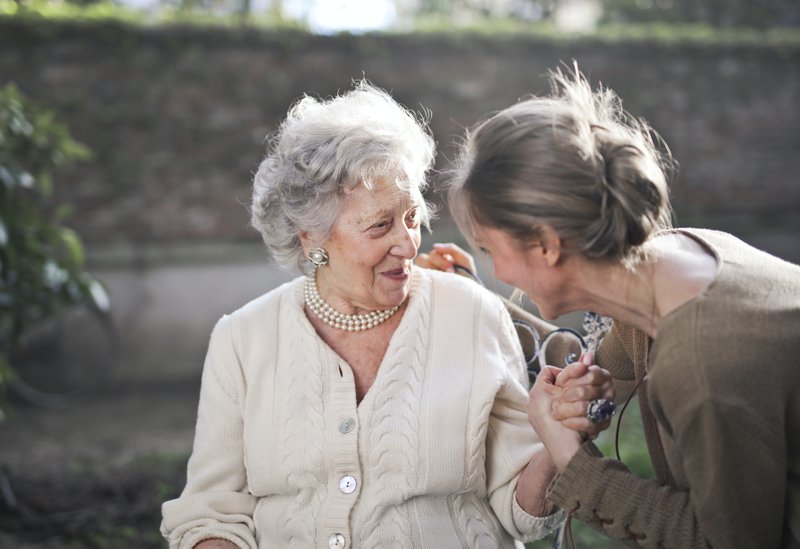Why should someone choose a career as an elderly caregiver? Choosing to become a senior caregiver can be an incredibly fulfilling and meaningful step. Before making the choice to move into this rewarding career, however, you should fully understand the role of caregivers and explore how a caregiver benefits from providing personal care for our aging population. Like any career path, you must examine many aspects of the position to determine if it is the right choice for you.
CareLink, the Area Agency on Aging for Central Arkansas, is a nonprofit agency providing resources for older people and their families. Our caregivers are an instrumental part of our home care service and mission, which is to connect older people and their families with resources to meet the opportunities and challenges of aging.
Understanding the Role of a Senior Caregiver
Imagine your average morning routine. You wake up at a certain time, ready to start your day, and then roll out of bed. You shower, you dress, you eat, and maybe you take your vitamins. These daily tasks seem simple enough, right? Most young and middle-aged adults do this each morning without much thought and, generally, without much effort.
For aging populations 65 and older, leaping out of bed and into the day is a much more difficult proposition. The daily routine of an older adult often requires far more time, energy, and consideration than younger individuals. A senior caregiver benefits the individuals they care for in a variety of ways that are indispensable to a high quality of life.
If you wonder why someone should choose a career as an elderly caregiver, part of the answer is in the very nature of the job. Choosing to follow the career path of an in-home caregiver means making it easier for members of the aging population to accomplish daily tasks, eliminating some of the more difficult aspects of day-to-day life, and providing the help necessary for seniors to live independently with a high quality of life.
A caregiver's job may look different for each person. Your role might encompass something as simple as accompanying an individual on a neighborhood walk or during physical activity. It might also range to more complex tasks like monitoring medications and medical equipment.
The complexity of your responsibilities is often impacted by the time and training you invest in your career. No matter which career path you choose, however, you will have the opportunity to make important and meaningful connections with the individuals to whom you provide care.

Types of Caregivers
Even though the range of services provided and licensing requirements may vary from state to state, there are five main types of in-home caregivers.
1. Personal Care Aides
Personal care aides (PCAs) provide services that increase the quality of life and allow elderly individuals to remain in their familiar home environment for a much longer period of time. One of the most important, indirect effects of these services is the immense amount of relief and ease of mind the caregiver provides for the senior’s family and loved ones.
Here at CareLink, all caregivers have to at least have their PCA’s certification. If not, CareLink provides that service at no cost to them. It is a minimum of 40-hour training with annual CEUs.
2. Home Health Aides
Home health aides (HHAs) perform many of the same tasks but are required to have at least 75 hours of training per federal guidelines. With this additional training, HHAs can provide more services, including monitoring the condition and vital signs of a patient.
3. Licensed or Certified Nursing Assistants
Licensed nursing assistants (LNAs) and certified nursing assistants (CNAs) are also federally required to have a minimum of 75 hours of training. LNA and CNA training is far more medically specialized. They can set up medical equipment in a patient’s home and provide care for various health conditions. Under the supervision of a Registered Nurse (RN), they may also administer some medical treatments
4. Skilled Nursing Providers
Skilled nursing providers, also known as licensed practical nurses (LPNs), must complete the education and certification process according to federal guidelines. Some requirements vary by state. LPNs can provide many direct care medical services that cannot be provided by PCAs, HHAs, or CNAs. Even more importantly, they are able to gain specialized training for occupational, physical, and speech therapies.
5. Registered Nurses
Registered nurses (RNs) hold a degree or diploma and have passed a federal licensing exam. RNs can administer medication, provide advice and guidance to families, and operate life-saving medical equipment. Both state and federal licensing may be required depending on the area.
Looking for an open senior caregiver position? Apply today!
Why Should Someone Choose a Career as an Elderly Caregiver?
Choosing a career path can be exciting as you begin to consider how it will affect your future – and what effect you can have on the world through your work. You must consider many aspects of a career to figure out how it will impact your life in the short and long term.
In particular, you should consider how any career you consider will affect your overall quality of life. Many careers can make you feel unfulfilled and stressed out. Achieving and maintaining a good work/life balance can sometimes be difficult.
There are many reasons why someone should choose a career as an elderly caregiver. Unlike a lot of other career options, a caregiver’s job offers unique professional and personal benefits, including:
- Working in a high demand career
- Flexible scheduling
- Excellent training & resources
- Social growth
- Emotional health
- Expanded worldview
Why Should Someone Choose a Career as an Elderly Care Provider: Professional Caregiver Benefits

Senior Caregiving is a High Demand Career
One of the biggest concerns in choosing a career is the ability to actually get hired in your field of choice. You do not want to devote your time and energy into training for a position, and then find that position nearly impossible to secure.
The care industry is booming and will continue to do so. The number of people who age will only grow over the next decades, and in-home care for our senior population will grow with it. Regardless of your geographic location, you will have several available opportunities that allow you to work closely with those in need.
In-home care for elderly individuals is quickly becoming the preference for US families. The U.S. Bureau of Labor Statistics has predicted a 33% growth in the need for home health employees between 2020 and 2030 – a faster-than-average growth compared to most other occupations. The demand will be even greater for personal care providers who are passionate, attentive, and caring.
Professional mobility is very desirable in any potential field, and Senior Care is no exception. Regardless of your initial qualifications, any number of opportunities are available. By expanding your education and training, you can become specialized in an even more high-demand aspect of elderly care.
If you are looking for the answer to why someone should choose a career as an elderly caregiver, this is a big one. The field provides a variety of career paths that offer job security and are in high demand. Becoming a senior caregiver is an obvious and rewarding choice.
Flexible Scheduling and a Dynamic Career Path
Do you flourish outside the constraints and standard hours of a 9-5 workday? Becoming a senior caregiver in a home environment will keep you out from behind a desk, create a schedule that fits your needs, and allow you to experience a dynamic work environment that changes with each client.
While some thrive in a predictable work environment, others prefer variety in their day-to-day interactions. For those in the second category, this is a big reason why someone should choose a career as an elderly care provider. Providing in-home care will give you many opportunities to shake up your daily routine. You get to be a stabilizing and invaluable part of someone else’s life at the same time.
Unlike many professions, being a senior caregiver will allow you to determine how many hours you want to work. Whether you want to devote more than 40 hours a week or prefer to work part-time, you can find the right position to fit your lifestyle.
Excellent Training and Resources
Some of the care you provide may be as simple as running errands, providing transportation, performing household chores, or feeding a loved family pet. However, incredible opportunities to hone your skills and get further training for in-home caregivers exists.
Enhancing your skillset and career-focused education does not stop with simply learning a particular skill. With more specialized education, a personal caregiver can take over more in-depth responsibilities. These might range from checking blood pressure to working with seniors who suffer from one of the many forms of dementia.
As an in-home care provider, you are providing an invaluable service to someone who needs your help. You are establishing relationships that truly enrich your life, bringing greater meaningfulness to your career. You also have the opportunity to continue your education in the field that holds your interest – for the entire span of this rewarding career if you want it to. This is another great reason why someone should choose a career as an elderly care provider.
CareLink provides training for PCAs at no cost to the interested caregiver. The resources available to caregivers in the field extend far beyond training, too. The online resources alone may seem almost inexhaustible online resources available. We have compiled the best of them for you right here.
National Senior Caregiver Resources
Some of the best local and national resources that provide specific support for caregivers of the aging population include:
- The Alzheimer's Arkansas provides resources for personal care of patients with early, middle, and late-stage Alzheimer’s. It is also helpful in learning more about identifying stages of the disease and what behaviors to expect.
- The American Parkinson's Disease Association is an excellent resource for caregivers in the home environment that provides links to online support groups, medical question forums, and information about palliative care.
- Daily Caring is a nationally recognized resource for caregivers and has an amazing selection of resources available. These range from gift guides to daily care and from senior health to dealing with the stresses of being a caregiver.
- The National Council on Aging devotes an entire section to caregivers on their site. It includes resources relating to how to deal with everyday issues (physically and mentally) that could arise for both you and the senior in your care.
Local Senior Caregiver Resources
Local resources vary by state (and even region), but they are widely available to both hired senior caregivers and family members who provide home care for their loved ones. Medical care for those living in a home environment is not the only resource available. Several states offer services for important aspects of day-to-day life.
Meals on Wheels: Meals on Wheels is a fantastic service designed to deliver hot, fresh meals to the home of homebound individuals. This service also organizes congregate meal sites for aging populations. It also manages to address safety hazards and provide holistic care.
Through in-home delivery and group meals where seniors can gather and meet, Meals on Wheels also provides the human interaction so essential to combat social isolation among seniors.
The yearly cost of providing a senior with Meals on Wheels is actually less than one night in a hospital or ten days in a nursing home. Qualifying seniors can receive meals at no cost, making this service invaluable, beneficial, and cost-effective. To qualify for delivery, seniors must be over 60 years of age, homebound, and unable to prepare meals.
Support for Aging in Place: Providing senior care in the home environment is focused on providing the assistance essential to allowing seniors to stay in their own homes. This is accomplished by providing help with daily tasks such as cleaning, cooking, bathing, or mobility assistance. Just a little extra support can often be the determining factor in a senior’s ability to remain independent in their home.
Staying in a familiar environment while living out the golden years of their lives has been consistently shown to be much better for seniors’ physical and mental health than being moved into a care facility. Aging in place with support allows seniors to live better, more independent lives.
Medicare Counseling: Medicare counseling and connected services are so important to seniors who must navigate Medicare, understand how it works, and find the best and most cost-efficient options. This counseling is conducted with trained staff who work closely with seniors, their caregivers, and their family.
Medicare counselors help seniors and their family members evaluate and update coverage, review medications, and potentially save hundreds of dollars. This assisted review should be performed every year to ensure seniors maintain the best coverage as their health and medical needs evolve.
Support for Active Seniors: CareLink’s resources for active, older people includes the wonderful opportunity for seniors to meet new people, stay active, and engage in interesting activities. This is accomplished through our seniors centers, fitness and nutrition classes, and many other opportunities for older Arkansans.
Staying active when you are 60 and older can keep you more independent for much longer. The National Council on Aging recommends everyone over 60 get at least some physical activity that is conducive with your mobility and health every day. Staying active can actually prevent bone loss, relieve osteoarthritis pain, help prevent chronic disease, boost immunity, and improve your overall mood.
Volunteering
Volunteering is a great opportunity for individuals who want to give back to the seniors in their community and for active seniors who want to engage more. Volunteering comes with a flexible schedule and allows those who participate to establish meaningful ties with the community.
Volunteering even for an hour a day (or week) can provide invaluable and desperately needed assistance for Arkansas seniors. Organizations like Meals on Wheels make a difference in just an hour on weekdays.
Becoming a volunteer ombudsmen involves working closely with residents in assisted living facilities and nursing homes. It is an especially important position for those who may not have family members available to speak up for them. Ombudsmen listen to residents in regards to how they are being treated in the facility, report senior abuse, and rectify issues when possible. Training to become a Volunteer Ombudsmen is provided at no cost.
Senior Centers offer several options for active older adults who need more socialization and want to spend time in a fun, positive environment. Volunteer opportunities are available for leading activities, taking attendance, or serving meals. The socialization and engagement provided by senior centers all over the country gives a sense of community often lost by isolation.
Specialized Caregiver Resources
Not everyone who is a caregiver is following the caregiver career path, but that makes having plenty of resources available even more essential. Caregiver burnout is a concern even if you aren’t a full-time or live-in caregiver but particularly for someone who lives with an individual who requires constant care. Specialized caregiver resources are available online and locally through social media and community organizations.
Family caregivers can find themselves feeling overwhelmed and in need of uplifting voices and resources. When you choose to decide to care for a loved one, it becomes incredibly important to care for yourself as well, and that includes your mental health.
Becoming a member of a support group and taking advantage of the available resources will make your new role more rewarding and less frustrating. In addition, to support groups, there are also grants available to help alleviate financial pressures that could hinder you and your family.
Career caregivers will usually have professional support through the company they choose to work with. Having other career care providers available with whom you can share experiences, difficulties, and successes with can be invaluable – especially early in your career. Online forums and social media pages are available at a click of a button and can be narrowed down to specialty, state, and even local areas.
Why Someone Should Choose a Career as an Elderly Care Provider: Personal Caregiver Benefits

Social Growth
The potential benefits on a personal level begin a whole new set of reasons why someone should choose a career as an elderly care provider. Regular social interaction has been proven to lengthen our lives and improve mental health in the short and long term.
Through social interaction, we learn and grow as individuals and build a sense of community. As a caregiver, you gain access to new relationships – with those you look after, their families, and even the caregiver community.
Emotional Health
Loneliness is something everyone deals with at some point in their lives. Individuals who are 50 and older, however, are at a much higher risk for the negative effects of being isolated. As a caregiver, you will not only provide in-home assistance, you will be able to connect with them on a personal and emotional level that will positively impact their lives and help ease those feelings of loneliness.
Making that social and emotional connection to those in your care will help bridge the mental and physical health disparity gap that a lot of elderly people experience when isolated. Regular human connection, especially emotionally, provides a bond with the outside world that they may not experience otherwise.
As a caregiver, making this emotional connection and improving the wellbeing of isolated individuals can, frankly, make you feel good. When you also have the opportunity to bond with other care providers who understand your journey, you may feel a special type of validation unlikely to be achieved elsewhere. Education and camaraderie are absolutely necessary to emotional wellness in the caregiving field.
Expanded Worldview
The average day of a home caregiver is incredibly dynamic. You will become a part of the daily tasks and routines of individuals (and their loved ones) from a variety of backgrounds. You become more aware of how other people interact with and experience the world. This helps develop your capacity for compassion and understanding. Experiencing diversity regularly can contribute to personal fulfillment and career success.
One of the most beneficial personal enrichment benefits of becoming a caregiver for seniors is experiencing the world through the lens of others. You are very likely to come into contact with families and individuals who will have a different background than you do. This is an incredibly valuable asset to have. Part of caring is knowing, acknowledging, and respecting the cultural and spiritual values and different perspectives of others.
The Benefits of Having a Caregiver
There are so many reasons why someone should choose a career as an elderly care provider. Perhaps one of the most important reasons for someone who enjoys helping others, physically and mentally, is that having a caregiver also provides a whole host of benefits for older adults.
That most people prefer receiving home-based care may seem obvious: It is home. In your own home, you are surrounded by tangible and intangible parts of your life. Few people actually want to leave those things behind and live somewhere without meaningful connections. We want to be comfortable, and home is usually where that comfort is found.
Aging in Place Improves Seniors’ Outlook
Being able to age in place is much better for seniors than long-term care facilities. Nursing homes, unfortunately, just do not have the comfort humans want. The memories and sensations of a home cannot be boxed up and moved to a sterile environment.
Nursing homes are also a monumental disruption to a senior’s life socially, mentally, and physically. Imagine only being allowed a small box of your most beloved items and to be moved into a room with hospital lighting, very little privacy, and very little freedom. Nursing homes also require cleaning on an industrial scale, typically performed using harsh-smelling chemicals, and they are never silent. Even the comforting smells and sounds are gone.
The career path of an in-home care provider is an incredible way to allow older adults to maintain their independence and stay in their own homes to enjoy their lives the way they prefer to live them. Home care gives seniors the opportunity to stay among what could be the best parts of their memories for much longer.
Maintaining Personal Identity and Autonomy
Our personal preferences are part of what makes up our identity. Removing choice from someone’s life can be defeating and render that individual depressed and directionless. Personal autonomy is incredibly important in maintaining dignity and mental health in the long term.
When older adults can stay in their homes, they can also keep their preferences and routines. Nursing homes regularly require residents to adhere to the timelines that work best for the facility – not the individual. Apart from dietary restrictions, nursing homes also provide a regulated menu regardless of individual preferences. There is no sneaking an unhealthy guilty pleasure snack or staying up late with an old movie.
While these facilities may have schedules in place, they are not necessarily for the benefit of the older individuals in their care. In-home care gives seniors more control, more independence, and more autonomy of choice to make the decisions about what is best for them.
Family & Social Ties
Our family and social connections keep us tied to the world and to our background. A cup of tea and a light conversation can be the balm needed to ease the pain of a difficult time. Even something as simple as watching your favorite television show with a friend can be life-extending for those who require in-home care.
Aging in place even gives you options like hosting a game night at the senior center. Being able to remain in your home while receiving care services makes this and so many other opportunities possible.
Unfortunately, when our elder population is forced into an assisted living facility or a nursing home facility, opportunities for connection may become very slim. Even a senior who is fortunate enough to locate a facility close to family and friends may suffer. These facilities can result in a distinct lack of familiarity.
Even geographically close families may visit less often, simply because visiting becomes difficult. Visiting hours are often within specific time windows and may not align with family members’ availability. Because of this, residents of these types of facilities are at a much higher risk of developing depression, leading to a deterioration of their physical health.
Aging in place allows seniors to retain the same schedule they’ve always followed. Grandkids can spend the night, friends can pop in whenever they want, and other family members can stop in for dinner or a cup of coffee at will. Even the frequent presence of a care provider offers more one-on-one socialization. This is important to consider when you wonder why someone should choose a career as an elderly care provider. This increased social activity does only good things for aging populations.
Slower Cognitive Decline
One of the most concerning parts of aging for many adults is suffering from memory loss. It is often inevitable to a certain degree, but it is not as bad for older adults who remain in a comfortable and familiar environment. Continuing to socialize within our family and friend circles can also help significantly decrease the degree of cognitive decline in older individuals.
The presence of items in seniors’ homes can actually help trigger memories. Olfactory (smell) triggers are incredibly strong prompters of memory. Familiar smells can also encourage recollection. Our surroundings aid in memory recall because we rely so heavily on our senses to take in the world around us. These odds and ends are instrumental in helping someone stay connected to their past.
Seniors who suffer from a form of dementia like Alzheimer’s benefit greatly from remaining in familiar surroundings and sticking to their normal routines as much as possible, too. Studies have shown that olfactory triggers increase memory recall in the early stages of Alzheimer’s. Providing this comfortable environment is imperative to maintaining a cognitive connection for as long as possible.
Among the many reasons why someone should choose a career as an elderly care provider is the potential to help decrease the cognitive decline in older adult clients. The many benefits of in-home caregiving for both caregivers and receivers are incredible.
Home Care Is More Cost-Effective
The “cost” of moving members of the aging population to long-term care facilities refers to more than money. However, the benefits of choosing in-home services do cost far less financially as well.

Financial Cost of Long Term Care Facilities
Research conducted by Genworth, a leading senior financial advisor, in 2021 determined that, on average, a private room in a nursing home costs $290 per day. This adds up to a startling $8,821 per month. Semi-private rooms are more cost-effective, though they still average $255 per day ($7,756 per month).
Without significant retirement income or savings, footing such a bill can be financially devastating to family members. More affordable care or care covered by insurance is available. Unfortunately, many of these facilities provide significantly lower quality care with fewer opportunities.
Financial Cost of In-Home Care
In-home care costs vary widely because not all elderly individuals need the same type of care. Genworth Financial also provides the best average cost breakdown of in-home care. Their survey found that the national average for in-home care is roughly $4,000 a month – approximately half the cost of a nursing home.
Fortunately, there are a plethora of local services available. They vary by state but for in-home care recipients, there are many specialized services available that are not available in a nursing home facility.
Physical and Emotional Cost of Care
Nursing homes can seem, at first glance, like the obvious choice when a loved one needs frequent supervision and/or long-term care. What we may fail to realize, however, is the effect living in a facility can have on a senior’s physical and mental health.
Elder abuse is a very real and devastating problem in nursing home facilities. It is so prevalent that Ombudsman Programs formed. This means someone is available to step in and advocate for residents.
Sadly, reports still show that as many as one in three long-term care facility residents have been victims of elder abuse. As many as two in three staff members who were surveyed admitted to abusing residents. With these alarming numbers in mind, it is unsurprising our aging population wants to remain in their own homes and avoid facilities altogether.
In addition to the potential for physical harm, the depression and isolation rates of seniors in nursing homes are far greater than those who remain in their home environment. A 2021 study found that depression is chronic in nursing homes, creating a widespread negative effect on 20% of residents.
It is important to note that the life-altering change of relocation to a nursing home and ongoing lack of personal autonomy exacerbates this issue. Sadly, depression in residents is often misdiagnosed or left untreated. This can lead to further issues with physical health which may include a shortened life expectancy.
Providing the services necessary to allow our aging population to remain in their homes greatly reduces the likelihood of elder abuse. When family members and loved ones are included in providing that care and work in tandem with professional care providers, this probability is even less.
Depression is also much less likely for patients who receive home care for a variety of reasons. They can maintain important social and familial connections more easily than those in facilities. This helps prevent feelings of isolation and loneliness. Seniors who receive in-home care can keep their normal routines and be surrounded by the comfort of familiarity. This delays cognitive decline and increases the overall quality of life.
When considering the reasons why someone should choose a career as an elderly care provider, being able to spare members of the aging population this experience is well up on the list.
For More Information
Whether you're an active older adult researching the benefits of becoming a caregiver; a family member considering becoming a caregiver for a loved one; or a passionate, dedicated person wondering why someone should choose a career as an elderly care provider, CareLink aims to provide as many resources and services as possible.
If you have more questions or are ready to start your career path as a caregiver, contact us online today!

How great that you talk about how a caregiver’s job can be different for every person. My grandparents are getting older and need more help this year. I will find a reputable senior care facility nearby to assist.
I love working for carelnk been working for them for 4 years now and i love it